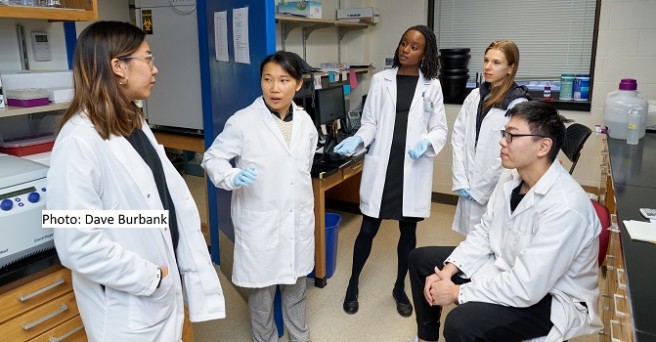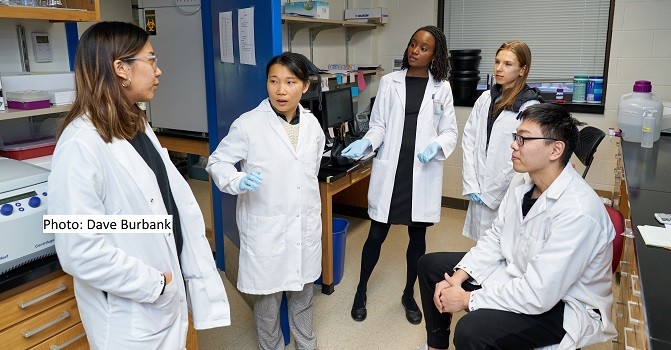Primary tabs
Ph.D. in Nutrition
explore graduate studies in nutritional sciences
Earning a Ph.D. in Nutrition
As Ph.D. candidate, you will be required to fulfill a minimum of six semesters of full-time study with courses in the field of nutrition and two additional graduate fields. You must pass the Admission to Candidacy examination within six semesters of matriculation and successfully defend your dissertation based on original research.
Your studies will be guided by a Special Committee that will include your research Chair and representatives of two additional graduate fields, plus an appointed representative of the field of nutrition. The committee will provide guidance in your course selections, determine your admission to doctoral candidacy and evaluate your dissertation.
Financial support is available on a competitive basis.
Learn more about admissions, special committee selection, financial support and more on the Graduate Studies homepage.
Contact us at dnsgrad@cornell.edu
As a candidate for the Ph.D. degree, you will concentrate in one of the following areas:
As a candidate for the Ph.D. degree, you will concentrate in one of the following areas:
In this concentration, you will have the opportunity to study nutritional issues in communities, including their causes,implications, and solutions.
These issues range from obesity to food insecurity, with the unit of analysis ranging widely from families to neighborhoods to governments. Causes for inadequate nutrition are multiple and complex, resulting from biological, economic, social, cultural,and policy issues. Implications of community nutrition issues include poor health and disease.
The program seeks to influence community issues and behaviors by conducting rigorous community-based research; leading community outreach and engagement initiatives; and teaching and mentoring students.
Our faculty members are interested generally in the following areas:
- designing, implementing and evaluating nutrition interventions and policies, in particular for limited resource and under-served populations
- understanding people’s food choices and the contributions of social, cultural, policy, and food systems to those behaviors
- understanding the distribution and causes of nutritional disparities in populations using tools from epidemiology, social sciences, systems science,and policy analysis
Their research interests cover a wide range of topics.
Graduate Study: Although the program is based within the Division of Nutritional Science, you may take courses across the university to meet your educational focus. To pursue this concentration, you will need a solid understanding of the biological as well as the social basis of human nutrition and health, along with the ability to apply social science theory and methods to work with groups and populations to address nutrition issues. You will also need substantive experience related to community research and/or engagement.
You will be expected to take courses that recognize the social, psychological, cultural, agricultural, economic, clinical, and public health policy determinants of nutrition and health as well as courses that provide you with expertise in the analytic and conceptual methods to address these issues.
Opportunities After Graduation: Doctoral graduates typically work for universities, government agencies such as the National Institutes of Health and the Centers for Disease Control and Prevention, and applied research institutions. Students who earn a master’s degree often work for public health, Cooperative Extension, community agencies,and educational institutions.
In this concentration, you will study how variations in individuals’ nutritional status affect their health and functioning. Faculty members are focused primarily on developing safe and effective methods for improving the human condition. In general, they are interested in the following:
- maternal, infant and child nutrition
- control of food intake and regulation of body weight,as well as animal models of obesity
- factors that affect the absorption, metabolism and storage of Vitamin A, as well as the association between Vitamin A deficiency and disease
- effects of nutritional alterations —for example, iron deficiency folate alterations and PUFAs—on mortality, work capacity,and behavior and cognitive functioning
- lasting cognitive effects of early exposure to environmental toxins, such as lead and methylmercury, including exposure via breastmilk
- metabolism, bioavailability and biological effects of Vitamin E, including mechanisms of regulation of Vitamin E status
Our faculty’s research interests cover a wide range of topics.
Graduate Study: Although the program is based within the Division of Nutritional Science, you may take courses across the university to meet your educational focus. To pursue this concentration, you will need a solid understanding of the biological basis of human biology, nutrition, health and disease,and statistics.
Opportunities After Graduation: Graduates of this program typically work in universities, such government agencies as the National Institutes of Health and the Centers for Disease Control and Prevention, and the food and health industries.
In this concentration, you will explore malnutrition and hunger, which are widespread in many developing countries, as well as chronic disease resulting from poor nutrition.
The causes of inadequate nutrition can be complex, encompassing biological, economic, social and political issues. Program faculty members address nutritional problems through research, nutritional education and training; applied nutrition programs in the community, government, and international organizations; and institutional development.
Our faculty’s research interests cover a wide range of topics.
Graduate Study: This concentration is dedicated to training committed professionals whose previous training and international experience provide a solid foundation for benefiting from Cornell's rigorous intellectual environment. Our faculty members have had experiences in many parts of the world, and their expertise covers the spectrum from basic biology to population-based interventions. You may take courses in political, economic, sociological, clinical and public health dimensions of nutrition. You will need a solid foundation in the biological aspects of nutrition and your academic background should include biochemistry, physiology and laboratory methods.
Opportunities: Students graduating from this program work for government ministries and other action agencies such as UNICEF and nongovernmental organizations; agencies that deliver technical assistance such as the U.S. Agency for International Development and the World Health Organization; and applied research institutions and universities.
In this concentration, you will investigate the basic biological processes in nutrition and nutrition’s roles in health and disease. The concentration integrates a range of disciplines including chemistry, biochemistry, biophysics, cell biology, genetics, neurobiology, and developmental and reproductive biology. A flexible curriculum will enable you to tailor your academic programs to your academic background, research interests, and career plans.
The research opportunities, using such methodologies as classical biochemistry, transgenics and mass spectrometry, are extensive and diverse:
- Nutritional biochemistry studies the biochemical, metabolic, physiological and epigenetic functions and properties of nutrients and other dietary constituents. The discipline is used to examine the synergistic relationships among diet, health and disease susceptibility. Students take an integrative curriculum in nutritional biochemistry and may take foundation courses in the basic biological, chemical and physical sciences. Most students complete a minor in biochemistry or molecular biology.
- Nutrition genomics examines the role of nutrients and dietary components in regulating genome structure, expression and stability, as well as the role of genetic variation on individual nutrient requirements. Research in nutritional genomics relies on genetic technology and models. It includes developing and using transgenic mice, microarray technologies for expression profiling, and human population genetics. Most students complete a minor in genetics.
- Nutritional metabolomics studies the regulation of metabolic pathways and networks by nutrients and other food components, as well as the establishment of analytical methods that profile human serum and urinary metabolites to assess nutritional imbalances and disease risk. Most students complete a minor in biochemistry or molecular biology.
- Maternal nutrition/fetal development/epigenetics looks at the molecular-level relationships between maternal nutrition and fetal development. Research topics include how maternal nutritional status regulates fetal gene expression (metabolic imprinting) and how to identify the consequences of such imprinting throughout the life of the offspring.
Our faculty’s research interests cover a wide range of topics.
Opportunities after Graduation: Graduates of this program typically follow careers in research and academics. They may work in universities, private research institutions, government and private industry.
Graduate Studies homepage
Contact us at dnsgrad@cornell.edu



